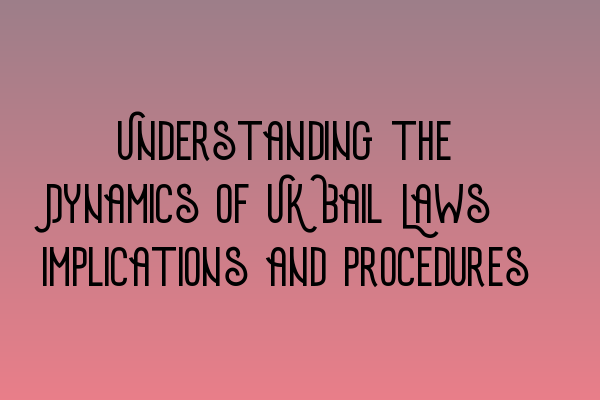Understanding the Dynamics of UK Bail Laws: Implications and Procedures
Introduction:
Bail laws play a crucial role in the UK criminal justice system, ensuring a fair and just process for both the accused and the victims. Bail allows individuals to be released from custody pending trial, with certain conditions imposed to mitigate flight risk or potential harm to the public. In this article, we will delve deep into the dynamics of UK bail laws, exploring their implications and procedures.
Key Concepts:
1. What is Bail?
Bail refers to the temporary release of an individual accused of committing a crime, allowing them to remain free until their trial. It is essential to strike a balance between protecting the rights of the accused and ensuring the safety of the public.
2. Types of Bail:
In the UK, there are two main types of bail:
– Police Bail: After arrest, the police can release an individual on police bail, subject to conditions such as regular reporting to the police station or surrendering their passport.
– Court Bail: When the case reaches the courts, the decision to grant bail lies with the courts. The court may impose various conditions, such as curfews, electronic monitoring, or surrendering passports.
3. Factors Considered by the Court:
When deciding whether to grant bail, the court considers several factors, including:
– Flight Risk: The court assesses the likelihood of the accused failing to appear for their trial.
– Public Safety: The court aims to protect the public by considering any potential harm or risk posed by the accused if released.
– Previous Criminal Record: The court takes into account the accused’s past criminal history, including any previous failures to appear in court.
– Strength of Evidence: The court examines the strength of the evidence against the accused, ensuring they do not pose a risk to the trial process.
Implications of Bail Laws:
1. Presumption of Innocence:
Bail laws in the UK are driven by the fundamental principle of “innocent until proven guilty.” Granting bail allows individuals to maintain their innocence while waiting for their trial.
2. Equal Access to Justice:
Bail laws ensure that individuals, regardless of their financial means, have a fair chance of presenting their case while awaiting trial. This prevents unnecessary pre-trial detention that could disproportionately impact vulnerable populations.
3. Public Safety:
While bail laws aim to protect individual rights, they also prioritize public safety. By imposing conditions on bail, such as electronic monitoring or restrictions on contact with victims or witnesses, potential risks can be minimized.
Procedures for Bail:
The process for obtaining bail involves various stages:
1. Arrest and Police Bail:
After the arrest, the police can release the individual on police bail. This typically involves attending the police station at specified times and complying with conditions set by the police.
2. First Court Appearance:
During the first court appearance, the court determines whether the accused can be released on bail or if they should remain in custody. The court considers the factors mentioned earlier.
3. Bail Hearing:
If the court decides that the accused should not be released on bail, a bail hearing is scheduled. At the hearing, the defense can present arguments in favor of bail, while the prosecution may raise concerns.
4. Bail Conditions:
If the court grants bail, it will impose certain conditions to address flight risk or public safety concerns. These conditions must be adhered to; failure to comply may lead to bail revocation.
Stay Informed and Prepared:
Understanding the dynamics of UK bail laws is essential for legal professionals, law students, and anyone involved in the criminal justice system. It ensures fair representation, upholds individual rights, and safeguards the public interest.
To further enhance your legal knowledge and prepare for SQE exams, explore the articles below:
– SQE 1 Practice Exam Questions: Test your knowledge with these practice exam questions.
– SQE 1 Practice Mocks FLK1 FLK2: Master your exam skills with these comprehensive practice mocks.
– SQE 2 Preparation Courses: Prepare for the SQE 2 exam with our specialized courses.
– SQE 1 Preparation Courses: Get ready for SQE 1 with our expertly designed preparation courses.
– SRA SQE Exam Dates: Stay up-to-date with the latest exam dates and registration deadlines.
Conclusion:
Bail laws in the UK are a crucial aspect of the criminal justice system. They balance the rights of the accused and the safety of the public. By understanding the dynamics and implications of UK bail laws, legal professionals can effectively navigate the bail process and ensure fair and just outcomes for their clients. Stay informed, stay prepared, and uphold the principles of justice.
